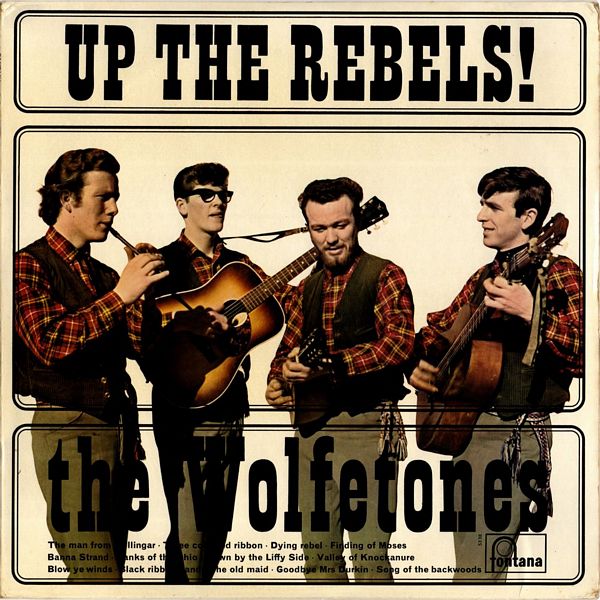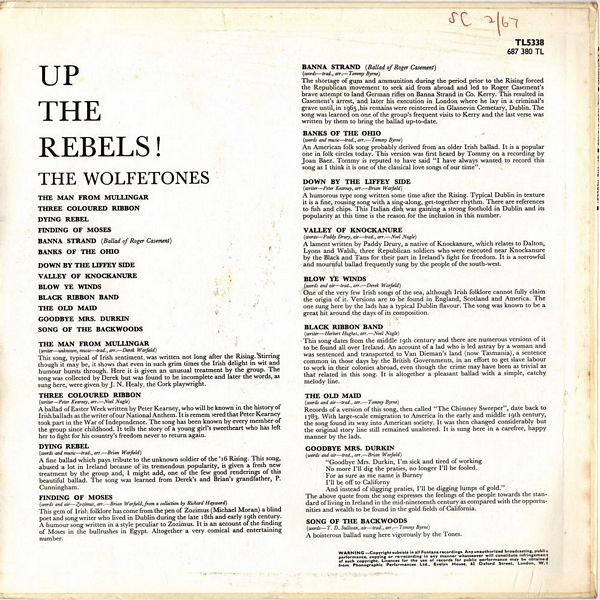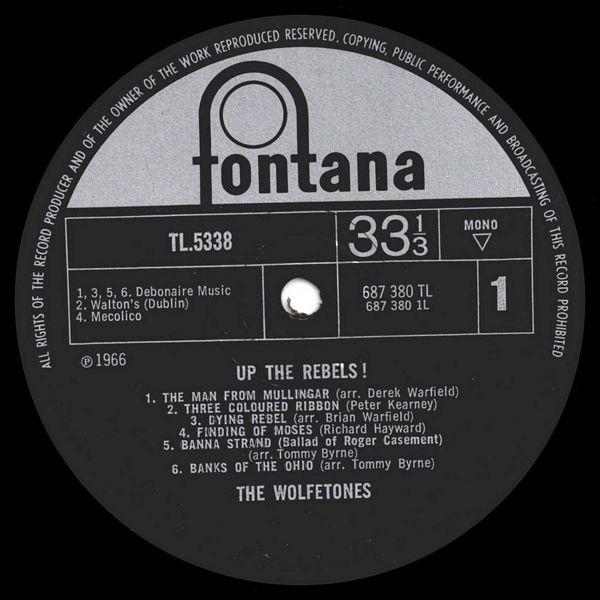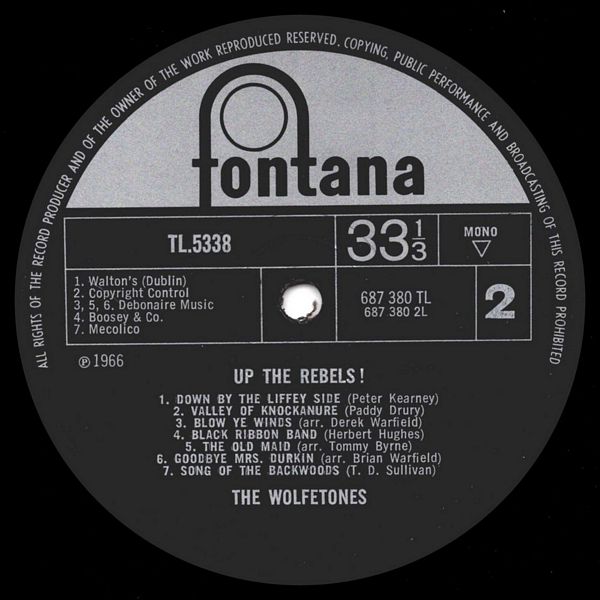

 |



|
Sleeve Notes
THE MAN FROM MULLINGAR — This song, typical of Irish sentiment, was written not long after the Rising. Stirring though it may be, it shows that even in such grim, times the Irish delight in wit and humour bursts through. Here it is given an unusual treatment by the group. The song was collected by Derek but was found to be incomplete and later the words, as sung here, were given by J.N. Healy, the Cork playwright.
THREE COLOURED RIBBON — A ballad of Easter Week written by Peter Kearney, who will be known in the history of Irish ballads as the writer of our National Anthem. It is remembered that Peter Kearney took part in the War of Independence. The song has been known by every member of the group since childhood. It tells the story of a young girl's sweetheart who has left her to fight for his country's freedom never to return again.
DYING REBEL — A fine ballad which pays tribute to the unknown soldier of the '16 Rising. This song, abused a lot in Ireland because of its tremendous popularity, is given a fresh new treatment by the group and, I might add, one of the few good renderings of this beautiful ballad. The song was learned from Derek's and Brian's grandfather, P. Cunningham.
FINDING OF MOSES — This gem of Irish folklore has come from the pen of Zozimus (Michael Moran) a blind poet and song writer who lived in Dublin during the late 18th and early 19th century. A humour song written in a style peculiar to Zozimus. It is an account of the finding of Moses in the bullrushes in Egypt. Altogether a very comical and entertaining number.
BANNA STRAND (Ballad of Roger Casement) — The shortage of guns and ammunition during the period prior to the Rising forced the Republican movement to seek aid from abroad and led to Roger Casement's brave attempt to land German rifles on Banna Strand in Go. Kerry. This resulted in Casement's arrest, and later his execution in London where he lay in a criminal's grave until, in 1965 ,his remains were reinterred in Glasnevin Cemetary, Dublin. The song was learned on one of the group's frequent visits to Kerry and the last verse was written by them to bring the ballad up-to-date.
BANKS OF THE OHIO — An American folk song probably derived from an older Irish ballad. It is a popular one in folk circles today. This version was first heard by Tommy on a recording by Joan Baez. Tommy is reputed to have said "I have always wanted to record this song as I think it is one of the classical love songs of our time".
DOWN BY THE LIFFEY SIDE — A humorous type song written some time after the Rising. Typical Dublin in texture it is a fine, rousing song with a sing-along, get-together rhythm. There are references to fish and chips. This Italian dish was gaining a strong foothold in Dublin and its popularity at this time is the reason for the inclusion in this number.
VALLEY OF KNOCKANURE — A lament written by Paddy Drury, a native of Knockanure, which relates to Dalton, Lyons and Walsh, three Republican soldiers who were executed near Knockanure by the Black and Tans for their part in Ireland's fight for freedom. It is a sorrowful and mournful ballad frequently sung by the people of the south-west.
BLOW YE WINDS — One of the very few Irish songs of the sea, although Irish folklore cannot fully claim the origin of it. Versions are to be found in England, Scotland and America. The one sung here by the lads has a typical Dublin flavour. The song was known to be a great hit around the days of its composition.
BLACK RIBBON BAND — This song dates from the middle 19th century and there are numerous versions of it to be found all over Ireland. An account of a lad who is led astray by a woman and was sentenced and transported to Van Dieman's land (now Tasmania), a sentence common in those days by the British Governments, in an effort to get slave labour to work in their colonies abroad, even though the crime may have been as trivial as that related in this song. It is altogether a pleasant ballad with a simple, catchy melody line.
THE OLD MAID — Records of a version of this song, then called "The Chimney Sweeper", date back to 1783. With large-scale emigration to America in the early and middle 19th century, the song found its way into American society. It was then changed considerably but the original story line still remained unaltered. It is sung here in a carefree, happy manner by the lads.
GOODBYE MRS. DURKIN — "Goodbye Mrs. Durkin, I'm sick and tired of working
No more I'll dig the praties, no longer I'll be fooled.
For as sure as me name is Burney
I'll be off to Californy
And instead of sligging praties, I'll be digging lumps of gold."
The above quote from the song expresses the feelings of the people towards the standard of living in Ireland in the mid-nineteenth century as compared with the opportunities and wealth to be found in the gold fields of California.
SONG OF THE BACKWOODS — A boisterous ballad sung here vigorously by the Tones.